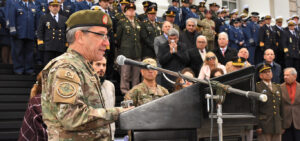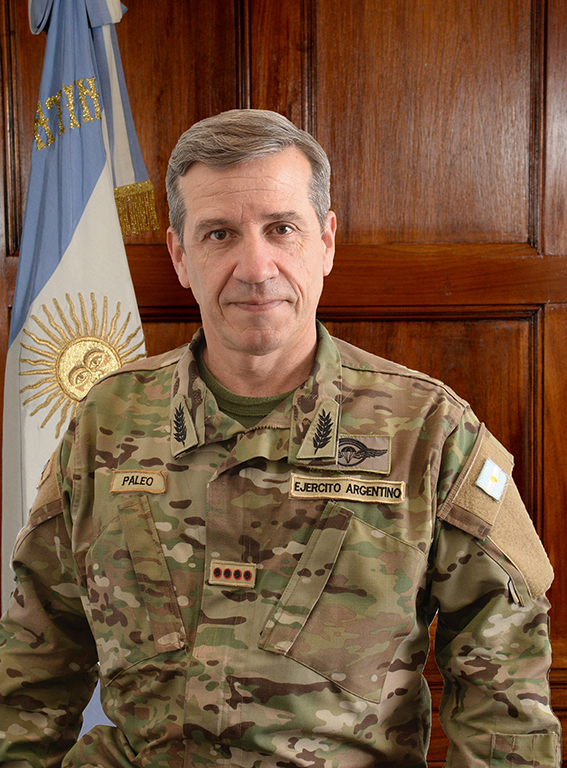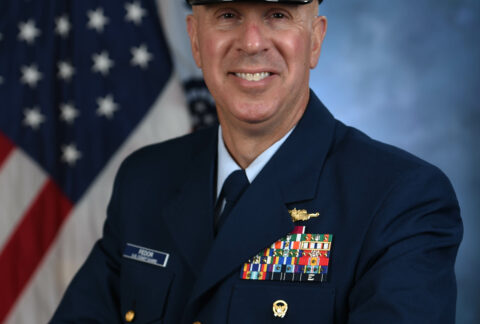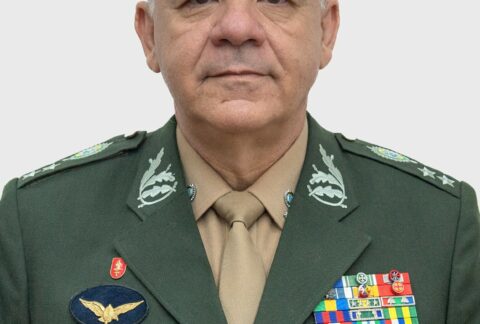The Argentine Armed Forces’ Joint Chiefs of Staff (EMCFFAA) is celebrating its anniversary. On September 9, 2022, the organization celebrated 74 years of institutional life and its chairman, Army Lieutenant General Juan Martín Paleo, further committed to strengthening its institutional mission of assisting and advising the Ministry of Defense on military strategy and consolidating a coordinated military strategic synergy with the Army, Navy, and Air Force.
Lt. Gen. Paleo spoke with Diálogo about the challenges of the EMCFFAA and its projections.
Diálogo: How do the Argentine Armed Forces contribute to the fight against transnational criminal organizations?
Lieutenant General Juan Martín Paleo, chairman of the Argentine Armed Forces’ Joint Chiefs of Staff: The current legislation restricts the use of the Armed Forces (FFAA) in matters pertaining to internal security, whose requirements the different security forces cover. This is clearly defined in Law No. 23.554 “National Defense Law” and in Law No. 24.059 “Internal Security Law.” The latter establishes, at the request of the Crisis Committee, that the Ministry of Defense may order the Armed Forces to provide logistics support and eventually engineers and communications to the actions carried out by the security forces to contribute to internal security. Also, as part of continuous operations, data is transmitted to the Armed Forces regarding irregular air, land, and river traffic, so that they can identify and adopt the corresponding measures.
Diálogo: What novelties do the Armed Forces have concerning tasks for the reestablishment of internal order, such as the fight against transnational crime, narcotrafficking, smuggling, contraband, and arms trafficking?
Lt. Gen. Paleo: According to the Internal Security Law, the Armed Forces do not participate in the reestablishment of internal order, with the only exception of actions to reestablish order in the military jurisdiction, in case of aggressions. The Armed Forces participate, under the leadership of the EMCFFAA, in surveillance and control operations in sovereign spaces, including the exclusive economic zone, the airspace, and some regions near the border, with low population density, always in compliance with the main mission established by the National Defense Law. During these surveillance and control operations, the detection of illegal activities that affect internal security is immediately transmitted to security forces so that they can carry out the necessary procedures to prevent them from taking place.

Diálogo: The Joint Aerospace Command (COCAES) works in coordination with the Armed Forces. How do you coordinate for the success of aerospace security?
Lt. Gen. Paleo: COCAES conducts its operations based on predictability and coordination as fundamental criteria to enjoy the necessary freedom of action for the success of aerospace defense and minimize the impact on civil and commercial aviation.
There is an operational coordination framework agreement between COCAES, the Argentine Air Force, the National Civil Aviation Administration, and the Argentine Air Navigation Company, which stipulates procedures, responsibilities, and priorities in the use of airspace. This agreement allows the flexible use of aerospace, where military and civil aviation operate in an organized and coordinated manner. It should be noted that, in aerospace defense operations, military means have priority over civilian aircraft.
Diálogo: How is the Joint Cyber Defense Command (CCCD) preparing to prevent threats originating in cyberspace?
Lt. Gen. Paleo: The CCCD prepares itself through a set of simultaneous and convergent activities, such as the continuous protection of defense computer networks and of national critical infrastructures. It also does so through interagency relations and joint exercises, participation in courses at the Armed Forces Cyber Defense Institute, in seminars and conferences, in training organized by the Inter-American Defense Board, and through educational opportunities from Brazil and U.S. Southern Command. In addition, the CCCD is a member of the Ibero-American Cyber Defense Forum.
Diálogo: How does the Multipurpose Ocean Patrol Vessel ARA “Contraalmirante Cordero” (P-54) contribute to the surveillance, control, and defense of national maritime resources and to the fight against illegal, unreported, and unregulated fishing?
Lt. Gen. Paleo: The incorporation of the ARA “Contralmirante Cordero” (P-54) allows us to expand surveillance and control capabilities of national maritime resources and contributes to the Argentine Naval Prefecture’s actions, which controls fishing activities in our exclusive economic zone and close to it. This implies not only a quantitative but also a qualitative leap in the development of sea control operations and the safeguarding of life at sea.
In turn, it strengthens the operational capabilities of the Joint Maritime Command, demonstrating a strategy of deterrence and effective surveillance and control of maritime space, more effectively covering the entire maritime littoral and also expanding its capacity for search and rescue operations and traffic control.
Diálogo: How do the Armed Forces contribute to and prepare for environmental security?
Lt. Gen. Paleo: The preservation and security of the environment is a constant concern for the military, and in this sense, the EMCFFAA and the Armed Forces have been pioneering organizations among the organizations of the national state.
Directives and specific orders for the strict application of measures aimed at environmental preservation have been in force for years and are constantly updated, both in all daily activities of the barracks and in those developed in operations, complying with national and international standards on the subject.
Even training activities are carried out under the concept of environmental sustainability and many training camps are among the best preserved areas from the ecological point of view.
In addition, I would like to mention that several large tracts of land throughout the country have been declared by presidential decree as Natural Defense Reserves. These areas are kept under the custody of the Armed Forces and are used for military training activities, under strict norms that ensure environmental sustainability.
Also noteworthy are the enormous efforts made on the Antarctic continent in matters of environmental preservation, with strict norms being applied to all the bases and joint settlements and those of the Armed Forces installed there.
Diálogo: What progress has been made in the area of gender integration?
Lt. Gen. Paleo: The Military Health Service incorporated the first military women. In 1995, with the voluntary military service, the incorporation of female soldiers took place, and from there female officers and noncommissioned officers (NCOs) of the arms and specialties were trained. Thus, by 2000, women officers and NCOs of Artillery, Engineers, and Communications, and of Quartermaster and Arsenals specialties were already serving in the Army. Finally, in 2012, women gained access to Infantry and Cavalry.
Today, women can occupy all the working spaces in the Armed Forces organizations with suitability as the only condition. Our Forces today have women in all arms, technical troops, specialties, and services. There are paratroopers, divers, mountaineers.
One of the objectives of the Integral Gender Policy Plan is to promote the careers of women in the command corps, which today represent 7 percent of the total. It is estimated that it will take 10 to 15 years for some of the women who today hold the highest rank of major to reach the rank of general.
The Ministry of Defense is working on the integration of women, incorporating gender perspectives in the training of the military, with a Diploma in Gender, a Specialization in Gender Policies, and the Micaela Law.









